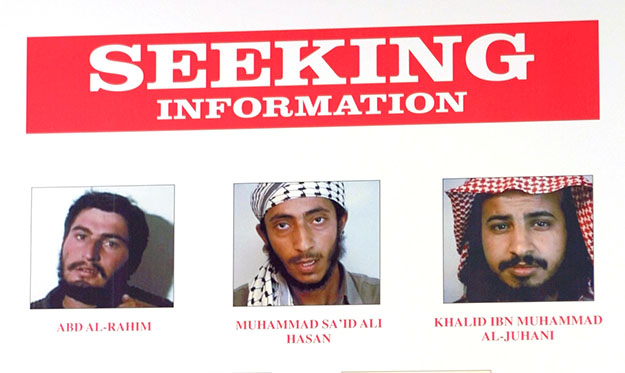Decoding Al-Qaeda’s Strategy: The Deep Battle Against America by Michael W.S. Ryan, 2013
Americans have struggled to understand al-Qa`ida’s motives and strategies since September 11, 2001. Many confuse its violent tactics as mandated by Islam, for example. While U.S. government defense agencies gain complex tactical and organizational intelligence in order to carry out sophisticated drone attacks, they do little to confront the terrorist group’s ideas. Middle East Institute scholar Michael Ryan sheds light on the origins and evolution of al-Qa`ida’s violent jihadi ideology in his new book, Decoding Al-Qaeda’s Strategy: The Deep Battle Against America. He is convinced that the United States will not win the war against al-Qa`ida militarily, as it has been attempting for a number of years. Rather, Ryan believes that the United States must ultimately defeat the movement in a battle of ideas.
Ryan asserts that the United States and its allies are largely successful in the “close battle” of combat against al-Qa`ida, but are failing in the “deep battle” of ideologies. As such, he argues that crushing al-Qa`ida militarily will not be sufficient and that the United States must instead put forth an effective counternarrative to the network’s storyline.
Ryan’s conclusions may surprise some readers. He demonstrates that many of al-Qa`ida’s strategies have their origins in Cold War communist ideology or Maoist guerrilla warfare. These strategies, which are based on secular reasoning, often run counter to common standards of morality prescribed by Islam. The United States can point out such contradictions inherent in al-Qa`ida’s ideology. Such a strategy is key, Ryan explains, because the United States can engage in a war of ideas without wrongly attacking Islam, a mistake that alienates the far majority of Muslims—including those who already disapprove of al-Qa`ida’s strategy.
The main objectives of the book are:
- To demonstrate that al-Qa`ida and its allies have a detailed, coherent strategy that tells us what they hope to achieve and how
- To describe that strategy from the perspective of key al-Qa`ida strategists
- To suggest some first principles of an effective counternarrative to that of al-Qa`ida
Keep an eye out for an in-depth review published in the Middle East Journal!
For Scholars
Ryan’s careful analysis of published Arabic sources and online jihadi forums, as well as a number of video and audio presentations by al-Qa`ida’s most influential leaders and their associates, is particularly useful for those studying jihadists and their movements. Aside from such detailed work on primary texts, Ryan also draws on a number of international sources, both scholarly and geared for a wider audience, that examine recent insurgencies and tactics and offer an in-depth look at the ideas used to spur them on.
The book is divided into five chapters: chapter one gives a brief historical background on al-Qa`ida’s vision of global jihad and describes its relation to Salafism and Wahhabism; chapter two describes the relationship between Osama bin Laden and Ayman al-Zawahiri, focusing on a post-9/11 strategy laid out by al-Zawahiri in Knights Under the Prophet’s Banner; chapter three turns to the terror organization’s leading strategists Abu Ubayd al-Qurashi and Abd al-Aziz al-Muqrin, analyzing their works and personal histories; chapter four examines the content and implications of Abu Bakr Naji’s The Administration of Savagery, which is a prime example of how al-Qa`ida bases regional operations within the context of war again the United States; and chapter five analyzes works by the influential jihadist writer, Abu Musab al-Suri to reveal the history of jihadi movements through his eyes and what he calls “the heart” of his call for Islamic resistance.
Primary Research Applications
- Counterterrorism
- Jihadism
- Insurgency
- al-Qa`ida ideology
- Radical Islam
- Modern guerrilla strategy
Further reading in the Oman Library (among other texts):
- After bin Laden: Al Qaeda, the Next Generation, Abdel Bari Atwan, 2013
- Militant Islamist Ideology: Understanding the Global Threat, Youssef Aboul-Enein, 2010
- The Search for al Qaeda: Its Leadership, Ideology, and Future, Bruce Riedel, 2008
- The Al Qaeda Reader, Raymond Ibrahim, 2007
- Knowing the Enemy: Jihadist Ideology and the War on Terror, Mary Habeck, 2006
- Al-Qaeda's Armies: Middle East Affiliate Groups and the Next Generation of Terror, Jonathan Schanzer and Dennis Ross, 2005
- Al Qaeda Now: Understanding Today's Terrorists, Karen Greenberg, 2005
- The Battle of Ideas in the War on Terror: Essays on U.S. Public Diplomacy in the Middle East, Robert Satloff, 2004
- Al Qaeda and What it Means to be Modern, John Gray, 2003
The Middle East Institute (MEI) is an independent, non-partisan, non-for-profit, educational organization. It does not engage in advocacy and its scholars’ opinions are their own. MEI welcomes financial donations, but retains sole editorial control over its work and its publications reflect only the authors’ views. For a listing of MEI donors, please click here.














